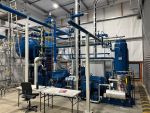The global climate change conference in Paris drew a record number of world leaders to the opening last week. Federated Farmers dairy industry group chair Andrew Hoggard looks at the debate.
The level of rhetoric is heating up along with the climate.
A lot of the debate on climate change in New Zealand concerns agriculture – dairy in particular.
NZ has a unique profile in the world: half our emissions are agriculture related. This immediately starts an argument on whether or not agriculture should be in the emissions trading scheme (ETS). But we should step back and look at the big picture: this is a global issue.
Climate change doesn't recognise national boundaries. NZ emissions don't just sit above NZ and only warm us; if they did I would have bought a V8 this winter.
So because this issue is global in scale the solution needs to be that, and consistent.
One big challenge I see is population growth: more people equals more demands. Unless Greenpeace comes up with a culling list to help match demand against supply, it is fair to assume not much will happen to control world population.
So the expectation is that everyone will still get fed and that food will still be affordable. This means you have to treat biological emissions differently from industrial emissions. The logical way to do this is to set efficiency targets.
Global benchmarks must reflect the efficient and the less-efficient in respect of various agricultural products – encouraging more production where it can be done efficiently and less where it occurs inefficiently or where this will encourage greater efficiency. With such a scheme, a big challenge is to get everyone to agree on the standard accounting methodology.
In the dairy industry, globally, this has been done. So the NZ dairy industry needs to discover promptly its carbon life cycle analysis under the framework developed by the international dairy federation; then we can debate with reference to relevant data rather than studies from a decade ago.
In the dairy industry globally there is a lot of inefficient production. Some countries are too focused on being self-sufficient in dairy production; this would be like NZ deciding to be self-sufficient in banana production. We could achieve that but with huge waste of resources; we can import them much cheaper from Central America.
Trade barriers and subsidies also drive inefficient global food production; ironically, note that countries most in support of tackling climate change are often those most at odds with trade liberalisation.
Climate change isn't a simple issue to be fixed with slogans and hashtags.
A lot of the simplistic arguments thrown up by the likes of Greenpeace might reduce NZ emissions, but that could lead to more 'less efficient' production globally, and thus higher global emissions.











